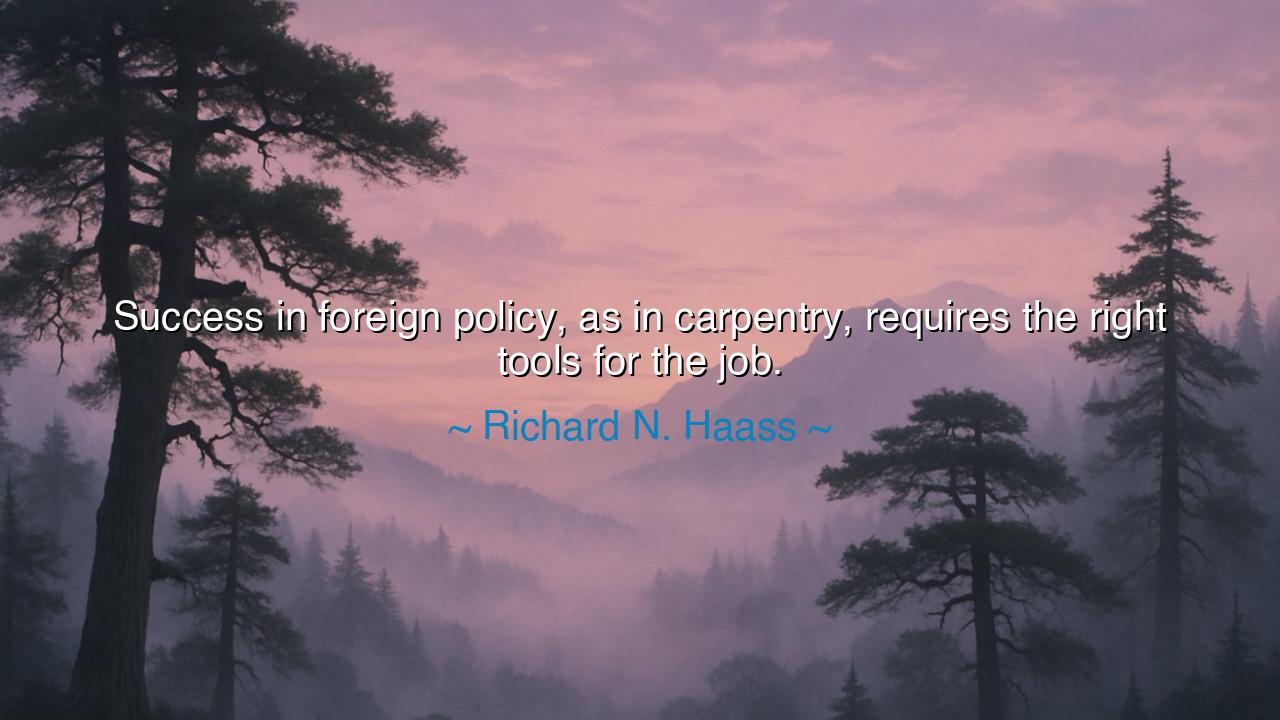
Success in foreign policy, as in carpentry, requires the right






Hear the words of Richard N. Haass, a sage of diplomacy, who declared: “Success in foreign policy, as in carpentry, requires the right tools for the job.” Do not let the simplicity of this saying deceive you, for within it lies profound wisdom. He reminds us that no great work—whether the building of a house or the shaping of nations—can be done with empty hands or with instruments ill-suited to the task. Just as the craftsman must know his hammer from his chisel, so too must the statesman know when to employ persuasion, when to wield power, when to extend mercy, and when to draw firm lines.
For the ancients themselves knew that governing is an art not unlike building. The Romans, master engineers and masters of empire, did not conquer with the sword alone, but with aqueducts, roads, laws, and alliances. Their “tools” were not all of war, but of integration, trade, and culture. The empire endured not because of sheer strength, but because they chose the right instruments for each moment—sometimes the legion, sometimes the treaty, sometimes the gift of citizenship. Thus Haass speaks with the voice of history when he likens the work of foreign policy to the careful labor of carpentry.
Consider the tale of the Marshall Plan after the Second World War. The United States might have chosen punishment and vengeance against the broken nations of Europe, but such a tool would have been a hammer striking already fractured wood. Instead, leaders chose the tool of reconstruction—aid, investment, and partnership. With this, they rebuilt allies from ruins, and in doing so, forged decades of stability. This was the wisdom of the craftsman: knowing that the strength of a house comes not from breaking its beams, but from repairing them.
Yet history also warns of times when the wrong tools were chosen. In the years of the Vietnam War, overwhelming military force was brought against a struggle rooted in ideology and culture. The sword was wielded where perhaps the scalpel of diplomacy and understanding was needed. The result was tragedy, for even the sharpest tool is useless if applied to the wrong material. Haass’ teaching is clear: it is not enough to possess strength—you must know when and how to use it.
This truth extends beyond nations. In our own lives, when we seek to resolve conflict, to build friendships, to lead others, we must discern which tools to use. At times, firmness is needed, like a hammer driving a nail. At other times, patience and subtlety are better, like sandpaper smoothing rough edges. To use the wrong approach is to splinter what we meant to build. Thus Haass’ wisdom, though spoken of foreign policy, applies to every human endeavor: discernment is the mark of true mastery.
The lesson is this: greatness lies not in possession of many tools, but in knowing which to wield at the right time. A carpenter with a chest full of instruments but no wisdom in their use will ruin the wood. A leader with armies, wealth, and influence but no judgment will ruin nations. But the one who studies, who reflects, who chooses carefully, becomes a builder of lasting works.
Practical wisdom follows: cultivate many tools in your life. Learn to listen as well as to speak. Train yourself in patience as much as in decisiveness. Study not only strength, but mercy; not only courage, but restraint. And above all, when faced with a task, pause to ask: what is required here? For the answer may not be the tool you first reach for.
So let these words of Richard N. Haass endure: “Success in foreign policy, as in carpentry, requires the right tools for the job.” Take them into your heart as both warning and guide. For whether you build a house, a friendship, or a nation, remember always that wisdom is not in the abundance of tools, but in the art of choosing rightly. This is the path of the true craftsman, the true statesman, and the true human being.






AAdministratorAdministrator
Welcome, honored guests. Please leave a comment, we will respond soon